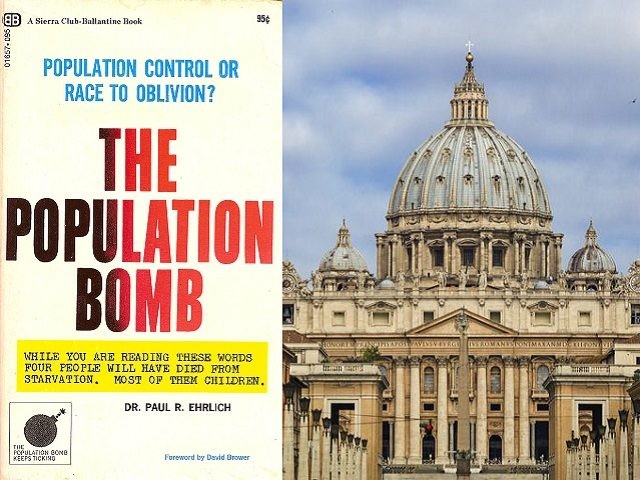The Vatican has invited the most notorious population alarmist in recent history to speak at an upcoming Vatican-run conference titled ‘Biological Extinction.”
The conference, sponsored jointly by the Pontifical Academy of Science and the Pontifical Academy of Social Sciences, will address issues of biodiversity, “great extinctions” of history, population and demographics.
Dr. Paul R. Ehrlich—who has defended mass sterilization, sex-selective abortion and infanticide—will speak on “Causes and Pathways of Biodiversity Losses: Consumption Preferences, Population Numbers, Technology, Ecosystem Productivity.”
To allow women to have as many children as they want, Ehrlich has said, is like letting people “throw as much of their garbage into their neighbor’s backyard as they want.”
Ehrlich became famous through the publication of his 1968 doomsday bestseller, The Population Bomb, which generated mass hysteria over the future of the world and the earth’s ability to sustain human life.
In the book, Ehrlich launched a series of frightening predictions that turned out to be spectacularly wrong, creating the myth of unsustainable population growth.
He prophesied that hundreds of millions would starve to death in the 1970s (and that 65 million of them would be Americans), that already-overpopulated India was doomed, and that odds were fair that “England will not exist in the year 2000.”
Ehrlich concluded that “sometime in the next 15 years, the end will come,” meaning “an utter breakdown of the capacity of the planet to support humanity.”
Mankind stood on the brink of Armageddon, the book proposed, because there was no way to feed the exponentially increasing world population. The opening line set the tone for the whole work: “The battle to feed all of humanity is over.”
Despite Ehrlich’s utter failure to predict humanity’s ability to feed itself, his theories will be dusted off and re-proposed in the Vatican in late February.
In its brochure for the upcoming workshop, the Vatican asserts in Ehrlichian doomspeak that “Earth cannot sustain” our desire for “enhanced consumption.”
Humanity is presently using about 156 percent of “the Earth’s sustainable capacity” every year, the text contends, and it is therefore essential to address “the question whether the Earth system is able to support the demands that humanity has been making on it” and “how global inequality and poverty relate to that.”
The conference will also feature a speaker from an environmental advocacy group called the Global Footprint Network (GFN), which each year calculates the day when the year’s available resources supposedly run out and mankind begins overconsuming nature.
“We use more ecological resources and services than nature can regenerate through overfishing, overharvesting forests and emitting more carbon dioxide into the atmosphere than forests can sequester,” the group exclaims on its website.
“On August 8, 2016, we will have used as much from nature as our planet can renew in the whole year,” GFN announced last summer.
In their brochure, the Pontifical Academies make the counterintuitive claim that biodiversity means “everything” for the human race, but then proceed to acknowledge that only 103 species of plants out of an estimated 425,000 species produce about 90 percent of our food worldwide. Moreover, just three kinds of grain, maize, rice, and wheat, produce about 60 percent of the total, the text notes.
Since none of these species are under any danger of extinction, one wonders how biodiversity can mean “everything” for humanity.
Just why the Vatican would wish to showcase the purveyor of debunked, apocalyptic theories is anybody’s guess, but it certainly cannot bode well for the relationship between faith and science.
Follow Thomas D. Williams on Twitter Follow @tdwilliamsrome

COMMENTS
Please let us know if you're having issues with commenting.